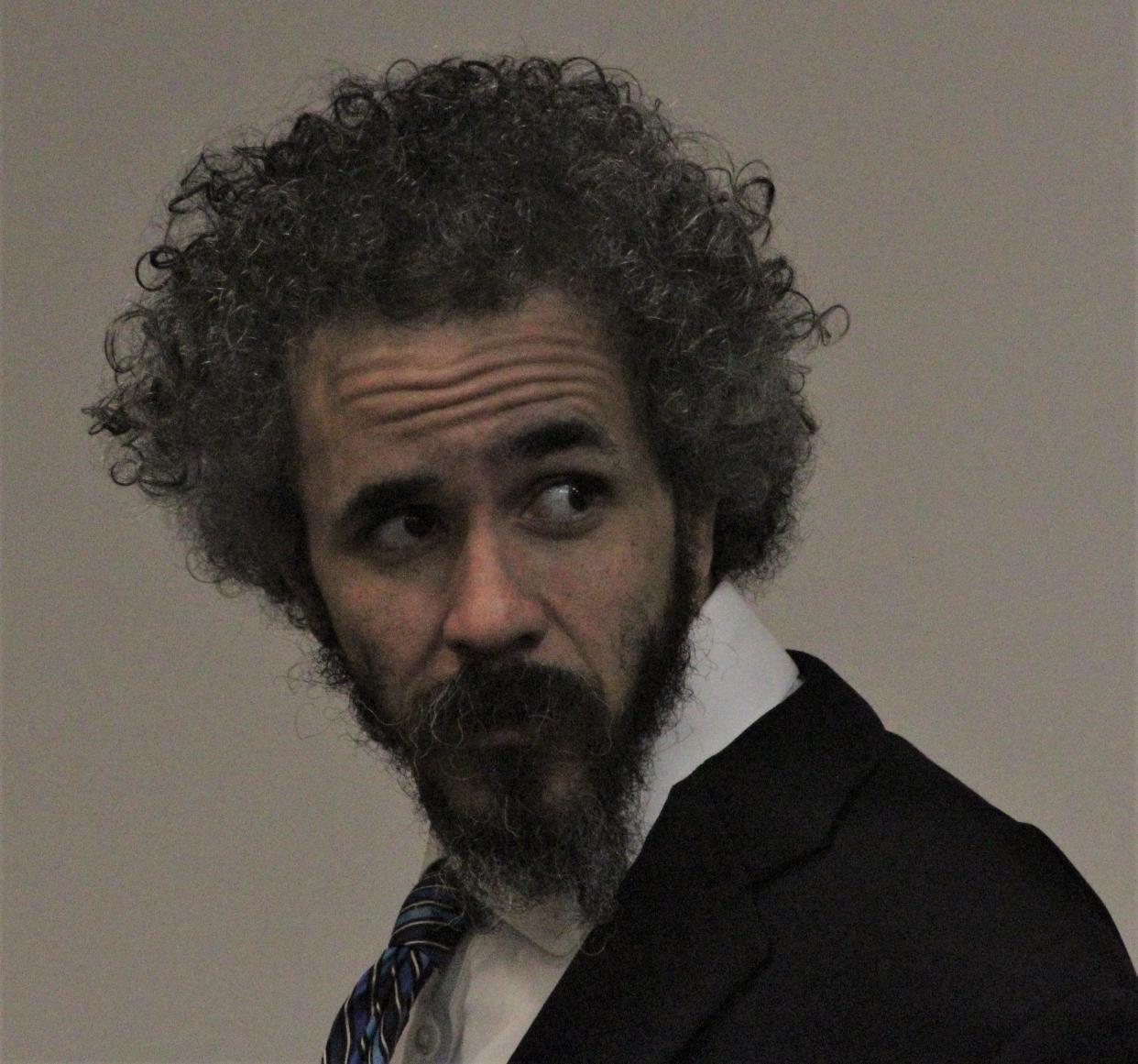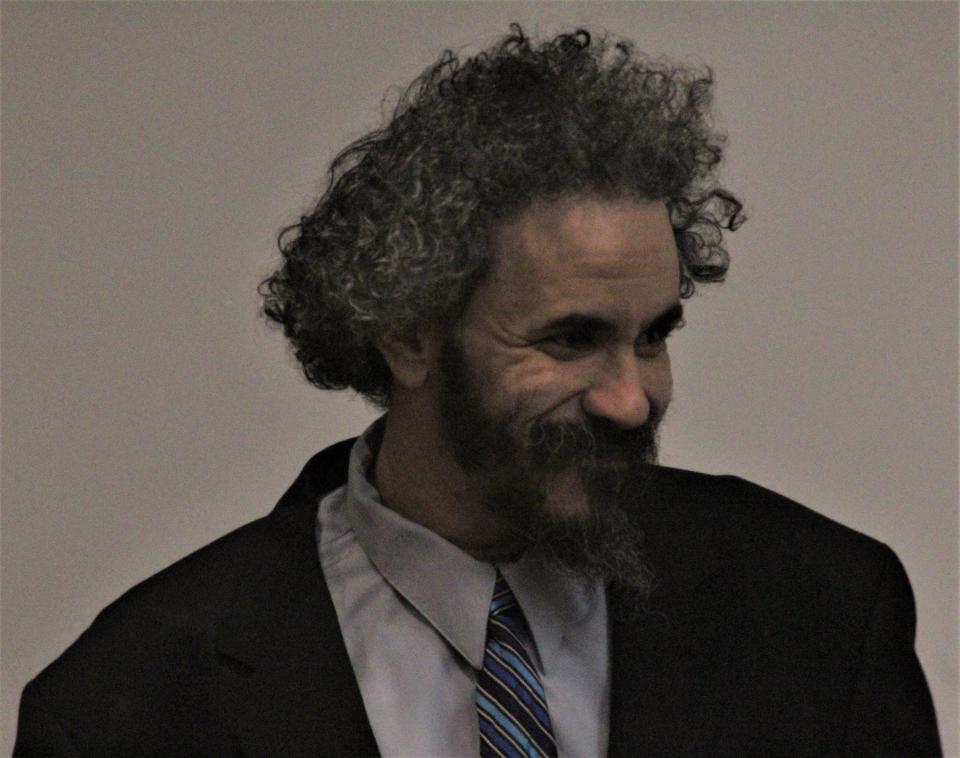Man sentenced to life in prison for fatally stabbing homeless woman as she slept on bench

A homeless man who fatally stabbed a homeless woman sleeping on a bench in DeLand was found guilty of first-degree murder Tuesday and sentenced to life in prison.
Jared Shaw, 36, was charged with first-degree murder in the killing of Christine McCaleb, 67. The jury deliberated for about 90 minutes before returning the guilty verdict.
Circuit Judge Elizabeth Blackburn sentenced Shaw Tuesday to the mandatory life in prison.
Shaw did not appear to show any reaction at the verdict or the sentence.
No one disputed what happened around 3 a.m. on Oct. 16, 2019. McCaleb was sleeping on a bench in front of the Bank of America at 230 N. Woodland Boulevard in DeLand. Shaw walked up to her, stabbed her in the chest and also sliced the back of her neck. She suffered wounds on one of her hands that the medical examiner testified could be defensive wounds from trying to grab the knife's blade. She died from the chest wound.
The defense argued that Shaw was legally insane, meaning he suffered from mental illness or defect at the time of the crime and did not know what he was doing, or that did know what he was doing but did not realize it was wrong.
On Tuesday, prosecutors and defense attorneys called dueling experts to the stand who shared opposite opinions on that point.
Lisa Potash, a psychologist retained by the defense, testified that at the time of the murder Shaw was suffering from schizoaffective disorder bi-polar type and he did not appear to be aware of what he was doing or the consequences of his actions. That would mean Shaw met the statutory requirement of insanity.
Dr. Jason Demery, a psychologist retained by prosecutors, testified that he did not believe Shaw met the statutory requirements to be found insane at the time of the crime, because he could not rule out that Shaw was under the effects of illicit drugs.
Prosecutors argue murder was premeditated
Assistant State Attorney Mark Interlicchio, who prosecuted the case along with Assistant State Attorney Helen Schwartz, asked jurors to convict Shaw of first-degree premeditated murder. He said Shaw’s purchase of a knife at Walmart two days before the killing was evidence of premeditation. He said Shaw walked back and forth by the bench were McCaleb was sleeping, stalking her before stabbing her.
Interlicchio also said Shaw stabbed McCaleb forcefully. He said Shaw tried to decapitate McCaleb.
Interlicchio also pointed to Shaw's behavior with deputies, saying he did not appear psychotic as he followed directions and answered questions from law enforcement.
He said that Potash ignored Shaw’s drug use in finding him insane at the time of the crime, even though police found meth in Shaw's pants pocket. Shaw had also overdosed 10 days earlier.
Interlicchio admitted Shaw had mental health issues, but he said Shaw was angry and fed up when he killed McCaleb.
Assistant Public Defender Brian Smith, who along with Assistant Public Defender Jessica Roberts represented Shaw, said after stabbing McCaleb, Shaw stood by her long enough to leave a small amount of his own blood. Then he rode his bicycle to a bench near Flagler Hall at Stetson University. He left a puddle of blood there along with the bloody bicycle. Then Shaw walked halfway to McCaleb’s bench before encountering deputies.
“And the state wants you to believe those are the actions of a sane man,” Smith said.
He said Shaw had no plan to kill when he bought the knife and that some homeless people carry knives.
And he said the state had not presented any evidence that Shaw had used meth that night.
Slain woman's family about Shaw: 'We don't hate him'
McCaleb’s daughter, Michelle Arel, of Ormond Beach, said it had been a long and emotional wait for the trial, which included a delay due to the COVID pandemic.
Her husband, Stan Arel, said the family does not have animosity toward Shaw.
“We don’t hate him, but we just don’t want him to do it again,” Stan Arel said.
“No, I forgave him,” Michelle Arel said.
Michelle Arel spoke to Shaw's adoptive family after the verdict.
“I don’t put any ill will toward his parents, his family, I love them,” Michelle Arel said. “I pray the best for them.”
She added as she held back tears: “I understand what they are going through because my mom was mentally ill too.”

Man describes Shaw: 'He just wasn't right'
Christopher Rodgers testified he met Shaw while both men were homeless.
Rodgers said he has since turned his life around, but in 2019 he was living on the streets of DeLand. He said homeless people would hang out in parks and go to soup kitchens.
Rodgers told Interlicchio that he was friends with Shaw and that they would give each other cigarettes.
In response to a question from Interlicchio, Rodgers described Shaw: “He was slow. He was not as advanced as a normal person … . He just wasn’t right. He wasn’t like a normal person."
He said he may have seen Shaw angry at times, but he had not seen him act physically violent.
Rodgers said at the time “we were all on dope," specifying methamphetamine when the prosecutor asked. But he said he had not seen Shaw use meth.
He said on the evening before the murder they had been hanging out by the tag office in DeLand because there was Wi-Fi there. He said Shaw was there among some others.
Rodgers said he did not see anyone doing drugs but said “we were all high. That’s just what we did.”
When asked if Shaw was acting violent toward anyone, Rodgers said “not that I recall, no, sir.”
Under cross examination, Rodgers said the only drug he had done with Shaw was marijuana.
Christine's Blankets
After his arrest, Shaw told DeLand Police that he thought the blanket McCaleb was using actually belonged to him, DeLand Police said at the time. But Shaw's defense attorneys successfully argued that his statements should not be allowed at trial because police obtained them while Shaw was still recovering from surgery and under the influence of medication at Halifax Health Medical Center.
After her death, McCaleb's family founded Christine's Blankets in her honor to provide blankets and other items to the homeless. McCaleb "was homeless for many years due to her struggle with mental illness," according to the organization's pamphlet.
Besides blankets, the organization provides items like care bags throughout the year and seasonal bags, with knit hats, gloves and scarves for the winter and flip flops, lip balm and sunscreen for the summer, according to the pamphlet from the group. For information, email christinesblankets@gmail.com.
This article originally appeared on The Daytona Beach News-Journal: Man gets life in prison for fatally stabbing homeless woman in DeLand

